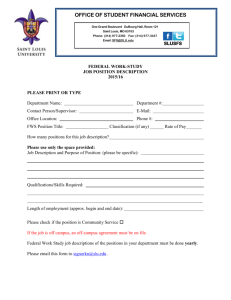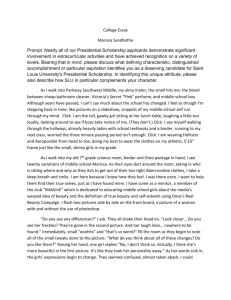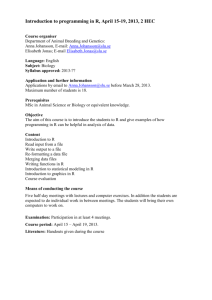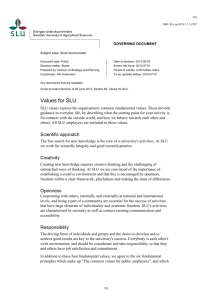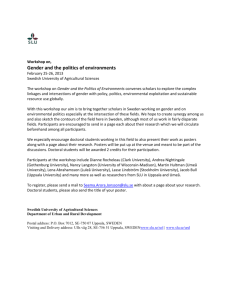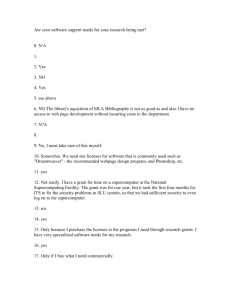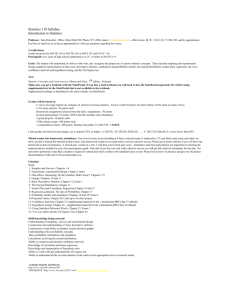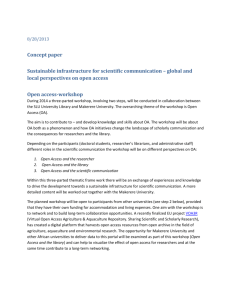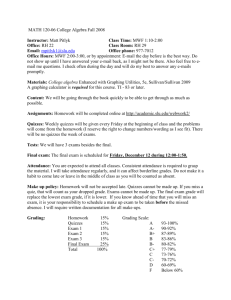Issue 2 - Saint Louis University
advertisement
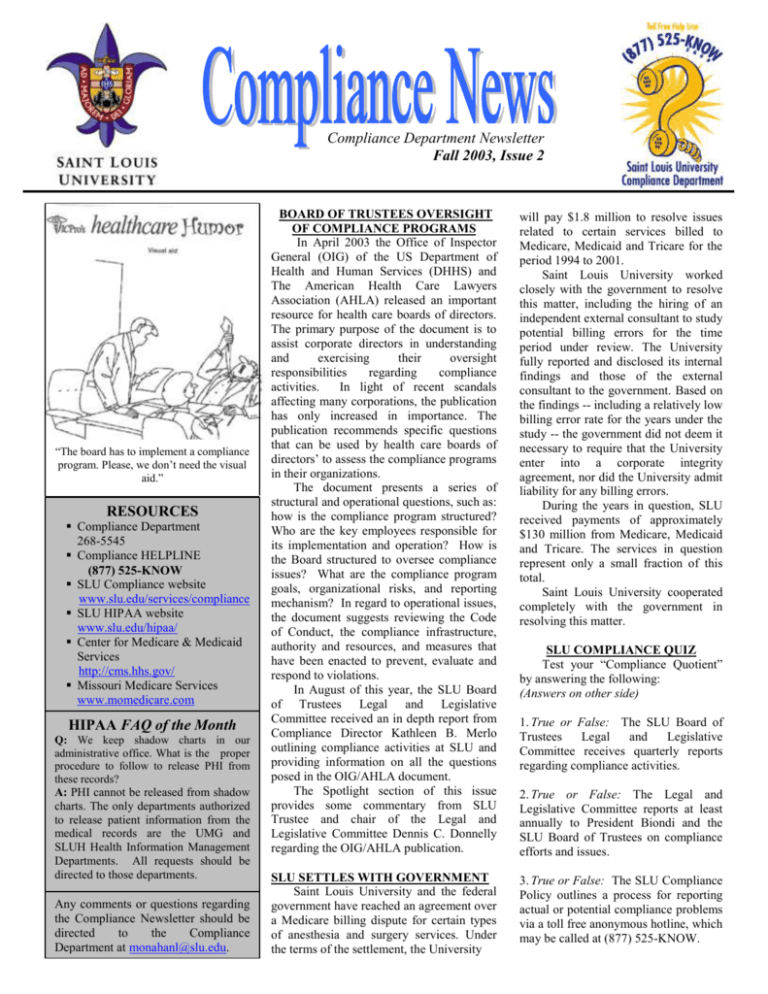
Compliance Department Newsletter Fall 2003, Issue 2 “The board has to implement a compliance program. Please, we don’t need the visual aid.” RESOURCES Compliance Department 268-5545 Compliance HELPLINE (877) 525-KNOW SLU Compliance website www.slu.edu/services/compliance SLU HIPAA website www.slu.edu/hipaa/ Center for Medicare & Medicaid Services http://cms.hhs.gov/ Missouri Medicare Services www.momedicare.com HIPAA FAQ of the Month Q: We keep shadow charts in our administrative office. What is the proper procedure to follow to release PHI from these records? A: PHI cannot be released from shadow charts. The only departments authorized to release patient information from the medical records are the UMG and SLUH Health Information Management Departments. All requests should be directed to those departments. Any comments or questions regarding the Compliance Newsletter should be directed to the Compliance Department at monahanl@slu.edu. BOARD OF TRUSTEES OVERSIGHT OF COMPLIANCE PROGRAMS In April 2003 the Office of Inspector General (OIG) of the US Department of Health and Human Services (DHHS) and The American Health Care Lawyers Association (AHLA) released an important resource for health care boards of directors. The primary purpose of the document is to assist corporate directors in understanding and exercising their oversight responsibilities regarding compliance activities. In light of recent scandals affecting many corporations, the publication has only increased in importance. The publication recommends specific questions that can be used by health care boards of directors’ to assess the compliance programs in their organizations. The document presents a series of structural and operational questions, such as: how is the compliance program structured? Who are the key employees responsible for its implementation and operation? How is the Board structured to oversee compliance issues? What are the compliance program goals, organizational risks, and reporting mechanism? In regard to operational issues, the document suggests reviewing the Code of Conduct, the compliance infrastructure, authority and resources, and measures that have been enacted to prevent, evaluate and respond to violations. In August of this year, the SLU Board of Trustees Legal and Legislative Committee received an in depth report from Compliance Director Kathleen B. Merlo outlining compliance activities at SLU and providing information on all the questions posed in the OIG/AHLA document. The Spotlight section of this issue provides some commentary from SLU Trustee and chair of the Legal and Legislative Committee Dennis C. Donnelly regarding the OIG/AHLA publication. will pay $1.8 million to resolve issues related to certain services billed to Medicare, Medicaid and Tricare for the period 1994 to 2001. Saint Louis University worked closely with the government to resolve this matter, including the hiring of an independent external consultant to study potential billing errors for the time period under review. The University fully reported and disclosed its internal findings and those of the external consultant to the government. Based on the findings -- including a relatively low billing error rate for the years under the study -- the government did not deem it necessary to require that the University enter into a corporate integrity agreement, nor did the University admit liability for any billing errors. During the years in question, SLU received payments of approximately $130 million from Medicare, Medicaid and Tricare. The services in question represent only a small fraction of this total. Saint Louis University cooperated completely with the government in resolving this matter. SLU SETTLES WITH GOVERNMENT Saint Louis University and the federal government have reached an agreement over a Medicare billing dispute for certain types of anesthesia and surgery services. Under the terms of the settlement, the University 3. True or False: The SLU Compliance Policy outlines a process for reporting actual or potential compliance problems via a toll free anonymous hotline, which may be called at (877) 525-KNOW. SLU COMPLIANCE QUIZ Test your “Compliance Quotient” by answering the following: (Answers on other side) 1. True or False: The SLU Board of Trustees Legal and Legislative Committee receives quarterly reports regarding compliance activities. 2. True or False: The Legal and Legislative Committee reports at least annually to President Biondi and the SLU Board of Trustees on compliance efforts and issues. CELEBRITY SPOTLIGHT Celebrity (noun): A famous person, hero, luminary, name, notable personality. The Compliance Newsletter spotlight this month focuses on Dennis C. Donnelly, Chair of the SLU Board of Trustees Legal and Legislative Committee. Mr. Donnelly is a partner in the law firm of Bryan Cave, LLP. He responded to questions regarding SLU compliance initiatives and provided the Board’s perspective regarding the document, “Corporate Responsibility and Corporate Compliance: A Resource for Health Care Boards of Directors”. Q: How are SLU Board members informed of compliance initiatives and issues within the University? A: The Board operates through its committees, that is, the working committee process. There are several committees, such as the Audit Committee, Executive Committee, Clinical Affairs, and the Legal and Legislative Committees, which regularly monitor compliance efforts and issues. As Chair of the Legal and Legislative Committee, I can assure you we appreciate and look forward to Kathy Merlo's quarterly reports. Moreover, the Committee has an obligation to report to the Board at least annually in a comprehensive fashion on the University's compliance efforts. In fact, we submitted such a report at the last Board meeting in September. The Board members on our Committee probe the compliance efforts and monitor it through that process. In turn, each of the Committees reports to the full Board about every ninety days on any compliance issues which are reviewed and monitored by that specific committee. Q: How does the OIG/AHLA document, "Corporate Responsibility in Corporate Compliance: A Resource for Health Care Boards of Directors" impact the University? A: This document is an excellent compilation and guideline for both the physicians dealing with the regulations in the first instance and the monitoring Boards of Trustees. The regulations are so expansive that it is useful, whenever possible, to utilize this kind of written guidance. Q: What are some of the challenging issues facing not-for-profit Boards of Directors in the compliance arena? A: Meeting the prime responsibilities of continuous monitoring of compliance efforts and exercising the correct amount of diligence to assure compliance are among the more challenging aspects of the Board's duties and responsibilities. The scope and breadth of compliance issues, whether in health care or the myriad of employment laws, requires consistent observation. Q: What are the Board’s expectations for the SLU Compliance Program? A: Our expectations are extremely high. We appreciate the educational efforts that the Compliance Department has undertaken in this regard, and expect there will be full compliance. Based on ten years of experience on the Board, I can assure you the compliance program has been greatly strengthened in our view. Unfortunately, the task is never "finally" accomplished. The challenge is to remain consistently vigilant at all operational levels to assure the directions from President Biondi and the Board to comply with the laws, regulations and programs applicable to the University are adhered to, substantively and procedurally. The purpose of this column is to shine the compliance spotlight on people or departments who make an outstanding contribution to the compliance initiative at SLU. Any department or member of the faculty or staff could be the focus of this column. If you would like to nominate someone for the Celebrity Spotlight, send an email to the Compliance Department. Include the individual or group name and a short message about their compliance efforts. Recent Fraud Alerts The following information is compiled from various compliance info.com websites: The Department of Health and Human Services and The Department of Justice released the “Health Care Fraud and Abuse Control Program Annual Report For FY 2002,” which reports $1.8 billion in judgments, settlements, and administrative impositions in health care fraud cases and proceedings won or negotiated by the Federal government in 2002. In addition, 362 criminal indictments were filed, 480 defendants were convicted for health care fraud related crimes during 2002 as well as 3,448 individuals and entities were excluded from participating in the Medicare and Medicaid. A United States attorney in Houston, Texas, announced that a local physician was sentenced to 151 months in federal prison, without parole, for health care fraud. The jury found the physician guilty of fifteen counts of mail fraud related to false billing. In addition to the maximum prison term under the applicable U.S. Sentencing Guideline range, a United States District judge also ordered the physician to pay restitution in the amount of $525,000 to the Medicare program and private insurers, and fined him $6.25 million. In Houston, Texas, local physicians and DME owners were charged in a multi-million dollar motorized wheelchair fraud scheme. The 101 count indictment charges the six individuals with allegedly billing Medicare/Medicaid a total of $32 million and receiving a total payment of $16 million for false, fraudulent and fictitious claims for services and equipment for Medicare/Medicaid beneficiaries. United States Attorney Ray Gruender announced that the Missouri Bone and Joint Center, Inc has agreed to pay $145,208 to resolve civil allegations that it miscoded diagnostic charges billed to Medicare for physical therapy services resulting in a higher rate of reimbursement payments from Medicare. William G. Couser, a University of Washington physician (a past president of the American Society of Nephrology, and current Editor-inChief of the Journal of the American Society of Nephrology) was sentenced to five years of probation, required to pay $100,000 in restitution, and perform one thousand hours (1000) of community service for health care billing related fraud. The physician pled guilty to a one count information charging him with a mail fraud scheme which involved making a false entry in a patient’s chart relating to a dialysis treatment in which he knowingly and willfully represented that he was present during the dialysis when, in fact, he had not been present, thus resulting in a false claim. Answers to Compliance Quiz: 1. True 2. True 3. True
